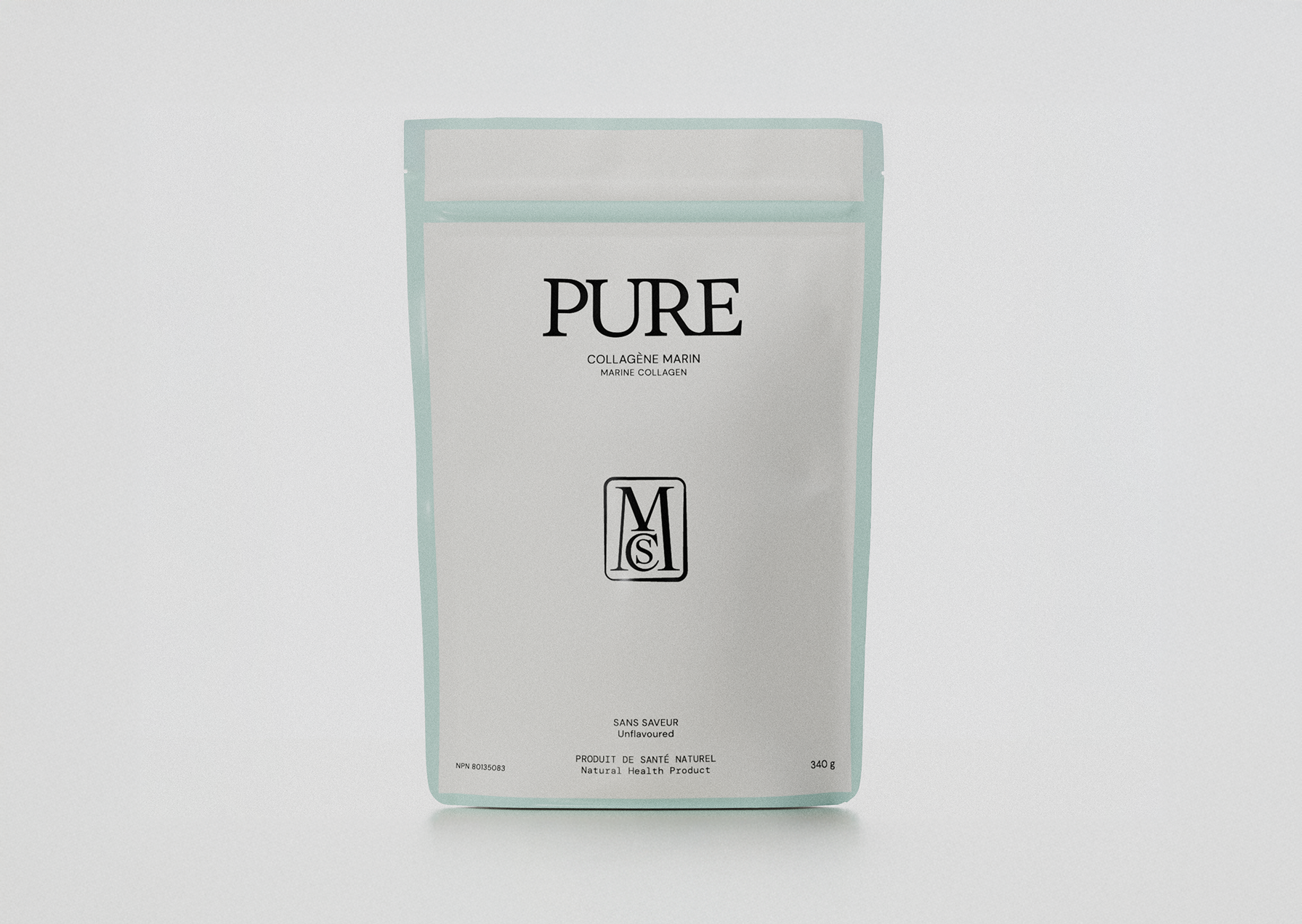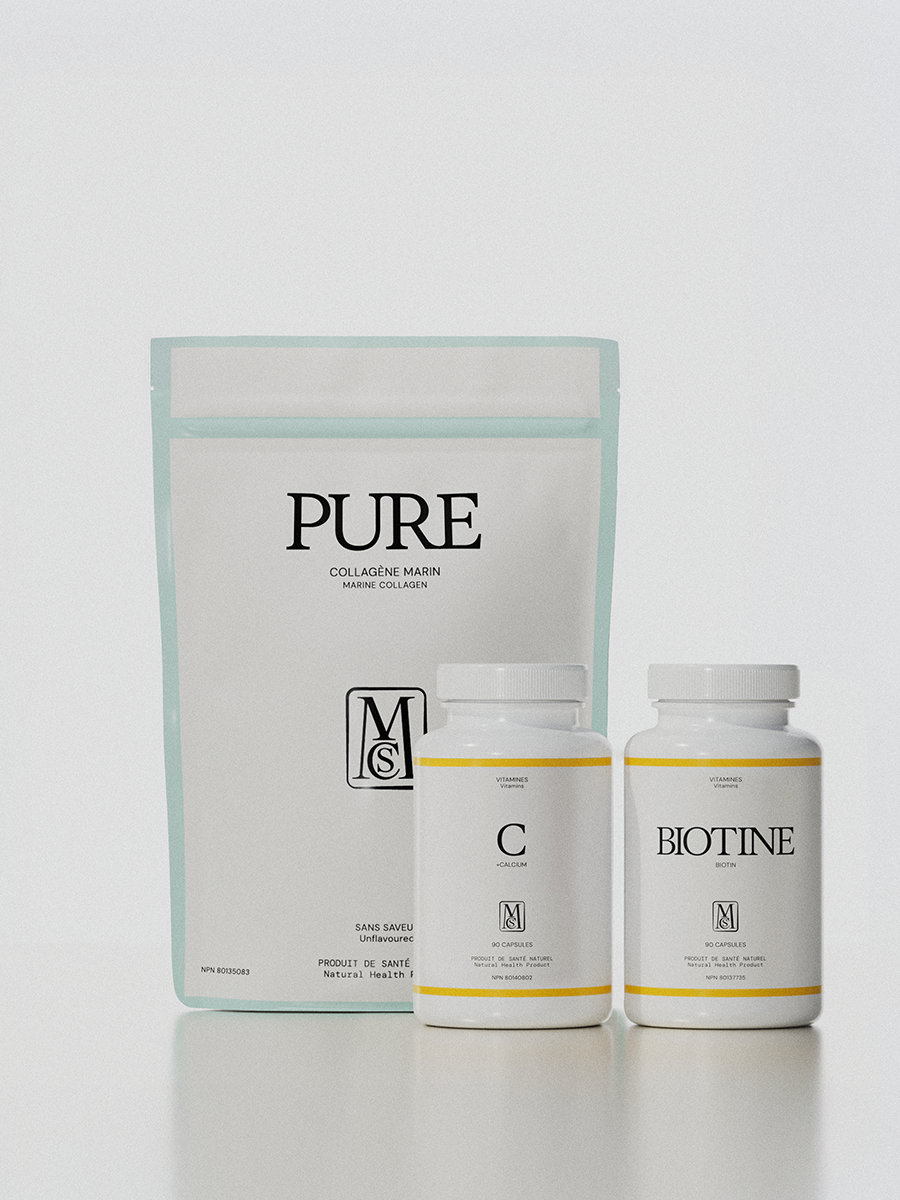Glowing skin, strong hair and flexible joints...
So many benefits attributed to a single natural ingredient. Its name? Collagen. And when this essential protein starts to become scarce in our bodies, more and more women (and men!) are turning to marine collagen supplements. What's really going on with this beauty ally that's causing a stir around the world? What are its true effects, its origins, its different forms, and most importantly, how can we incorporate it into our routine? We'll tell you everything you need to know about this key trend.
In the human body, collagen is the most abundant protein. It's what makes up the white fiber of skin, bones, tendons, and cartilage, among other things. In other words, it's this fibrous tissue that holds everything in place and keeps us together. However, with age, natural collagen production declines, which can result in the appearance of wrinkles, sagging skin, and reduced joint flexibility. It's in this context that supplementing with different types of collagen can become an ally in your daily routine.
1. What is marine collagen?
ORIGINS
Marine collagen is a natural protein derived from the connective tissues of fish. Unlike bovine or porcine collagen, marine collagen is often preferred for its bioavailability. In other words, it is better absorbed by our bodies, increasing its effectiveness.
A fish's skin must withstand the pressures of its aquatic environment, including friction, pressure, and microorganisms. This resistance is largely ensured by a high concentration of collagen, which gives it flexibility and strength.
2. Methods of extracting marine collagen
Marine collagen extraction is typically done through an enzymatic hydrolysis process: the collagen is broken down into small peptides called "hydrolyzed collagen." This process results in a high-quality product that's easy to incorporate into your daily routine and doesn't have a fishy odor or unpleasant taste.
Made in Quebec, PURE marine collagen is a natural health product that helps relieve joint pain and support natural collagen production.
“Marine collagen has helped me a lot,” says Marie-Claude Savard, owner of EMCS. “I realized that when the body works so hard to produce collagen, as we get older, it becomes exhausting. When I started taking collagen, combined with biotin and vitamin C—my beauty trio—I regained my hair, my skin glow, strong nails, and full eyelashes. It was a turning point.”
3. What does marine collagen contain?
Marine collagen consists primarily of hydrolyzed collagen peptides, obtained by enzymatic hydrolysis of fish tissues such as skin and scales. These peptides are small chains of amino acids that support the structure of skin, joints, and connective tissues.
ORIGIN OF PURE MARINE COLLAGEN FROM MARIE-CLAUDE SAVARD
PURE Marine Collagen is sourced from wild-caught fish selected for their quality. Its formula contains hydrolyzed marine collagen peptide powder, obtained by enzymatic hydrolysis of cod scales and skin. Manufacturing is carried out in a Good Manufacturing Practices (GMP)-certified facility, ensuring a product that meets the highest standards. Lab-tested to ensure purity, it is free from drug additives and enriched with natural and artificial flavors, sucralose, and Stevia rebaudiana leaf extract. The PURE range has been designed for optimal intake, without unnecessary ingredients, so you can use it with confidence.
4. At what age can you start taking marine collagen?
The question of the age at which marine collagen should be introduced into one's wellness routine often raises questions. While the decision may vary from person to person, there is no specific age to start consuming it. But the truth is that, from the age of 25, our body's natural collagen production begins a gradual decline, without us realizing it. According to the most recent studies, collagen production decreases by 1% per year from this age. As a result, the skin gradually loses its firmness, joints become stiffer, and the body's overall tone gradually diminishes.
In women, hormonal fluctuations play a key role: estrogen actively contributes to collagen synthesis in the skin. During menopause, the drop in estrogen levels promotes skin aging. Collagen supplements are therefore particularly beneficial before and during this period.
This biological process is also the same in men. Just as in women, supplementation can help support joint and muscle health.
For both men and women, marine collagen consumption can be considered from the early thirties to counteract the natural decline of this protein. For optimal results, the key lies in consistency: regular supplementation, combined with a balanced diet and a healthy lifestyle, promotes healthy skin, tissues, and joints.
5. What are the benefits of collagen?
Marine collagen powder offers benefits for joints and skin health, but its benefits go beyond appearance. What are its main benefits for the body?
HUMAN BODY
Collagen, as a major component of our connective tissue, plays a key role in maintaining our internal structure. It helps maintain the structure, firmness, and elasticity of the skin, while supporting the health of joints, ligaments, and tendons.
JOINT PAIN
Many people suffer from joint pain or stiffness, especially with age or after intense physical activity. Regular intake of marine collagen may help support joint health. However, it's important to note that its beneficial effects are not immediate and consistency in supplementation is key.
VISIBLE BENEFITS ON THE SKIN
One of the major benefits of internal collagen is its ability to maintain skin elasticity. With marine collagen supplements, many users report improved skin elasticity, reduced fine lines, and a more radiant complexion.
HAIR
While science doesn't definitively support the claim that marine collagen boosts hair growth or shine, some people report that their hair looks stronger and healthier.
NAILS
Similarly, marine collagen users often report healthier, stronger, and less brittle nails. While these beneficial effects can vary from person to person, many notice a real difference.
6. Discover the 3 types of collagen
There are several types of collagen, each with its own specificities:
COLLAGEN TYPE I
This is the type of collagen that primarily makes up skin, tendons, and ligaments. It plays an essential role in wound healing, skin elasticity, and holding connective tissues together.
COLLAGEN TYPE II
It helps build cartilage found in the body's connective tissues, making it beneficial in preventing joint pain.
COLLAGEN TYPE III
Often associated with type 1, it is found in the skin, muscles, and blood vessels. It contributes to the structure of tissues.
7. What are the different formulas of marine collagen?
Marine collagen now comes in several forms to meet individual needs and preferences. Here's a look at the top formulas you can easily incorporate into your daily routine:
COLLAGEN POWDER
This formula is very practical: the marine collagen peptide powder mixes easily into hot or cold drinks and can be integrated into your morning or evening routine, effortlessly. Its neutral texture makes it an easy ally for regular consumption. The 10g sachet format of PURE marine collagen powder is particularly interesting for taking your daily doses in powder form everywhere you go.
“The advice I give to people who want to try it is not to make any major lifestyle changes,” recommends Marie-Claude Savard. “You have to integrate it into something already in your routine (coffee, tea, herbal tea, or something else). If they decide to make a healthy collagen smoothie, but they don’t normally make it, it might not stick. So I recommend adding it to something you know, and then exploring other uses.”
LIQUID COLLAGEN
Generally more concentrated, liquid collagen often comes in bottles or ampoules for rapid absorption. Some formulas sometimes come in combination with other ingredients, such as vitamins or plant extracts.
8. What is the daily dosage to be respected?
To fully enjoy the benefits of marine collagen, it's essential to follow the recommended daily dosage. Most experts suggest consuming between 2.5 and 10g of hydrolyzed collagen peptides per day, depending on your goals and the product's formulation. Simply add the recommended dose to your cups of liquid and you're good to go!
TAKE COLLAGEN EVERY DAY
Consistency is essential to fully benefit from its beneficial effects. At MCS, the recommended dosage is 10g per day. Consuming it at the same time each day will help you create an effective routine. Regarding side effects, some people may experience gastrointestinal discomfort or digestive upset and may want to reduce the dose slightly, if necessary.
WHY RESPECT THE DOSAGE?
An insufficient dose could limit effectiveness.
Excessive dosage does not necessarily provide better results and may be unnecessary or cause adverse effects, especially in people with contraindications.
9. What are the contraindications?
Although marine collagen is generally well tolerated, there are some precautions you should be aware of, especially if you have any specific health conditions or allergies.
RENAL FAILURE
People with kidney problems should consult their doctor before taking marine collagen.
ALLERGY
People with fish allergies should also be cautious. If you have an allergy, opt for collagen from bovine or porcine sources, or consult a healthcare professional for personalized advice.
HYPERCALCEMIA
Some formulations may contain calcium, so it is advisable to check the composition if you are at risk.
PREGNANCY AND BREASTFEEDING
Pregnant or breastfeeding women should also consult their doctor before starting any supplement, even natural ones.
FAQ
HOW EFFECTIVE IS MARINE COLLAGEN REALLY?
The studies published so far suggest that regular intake of marine collagen can help support joint health and aid natural collagen production. However, it's important to remember that effects vary from person to person, and an active lifestyle plays a vital role in overall health.
WHAT ARE THE SIGNS THAT INDICATE A NEED FOR COLLAGEN?
There are some signs that your body may not be producing enough collagen:
• Loss of skin elasticity
• Appearance of wrinkles (especially fine wrinkles and deep wrinkles)
• Joint pain or stiffness
• Brittle nails
• Dull hair
WHAT ARE THE REAL EFFECTS OF COLLAGEN ON THE SKIN?
Marine collagen does not replace a skincare routine or a balanced diet, but it can support the decline in natural collagen production in the body.
Finally, to optimize its effects, it is advisable to maintain a diet rich in vitamin C or supplemented with vitamin C+ supplements (which participates in the synthesis of collagen) and to adopt healthy lifestyle habits.







